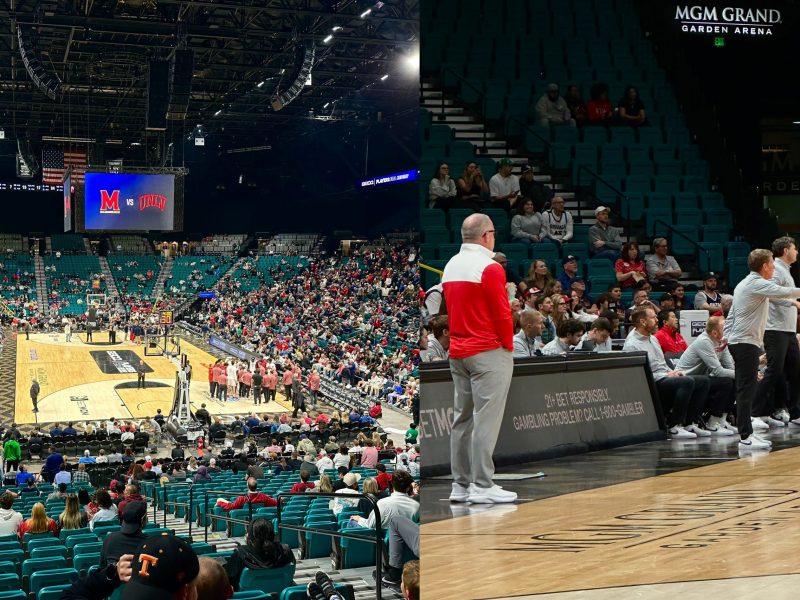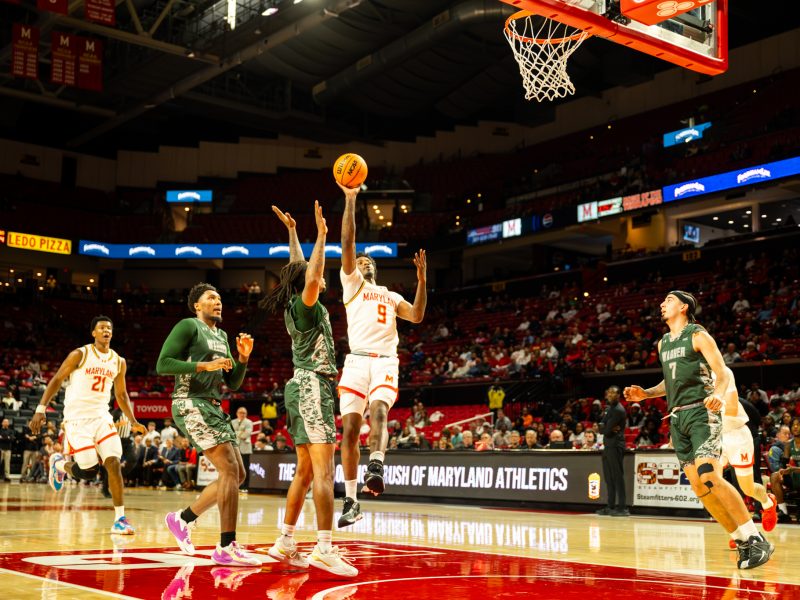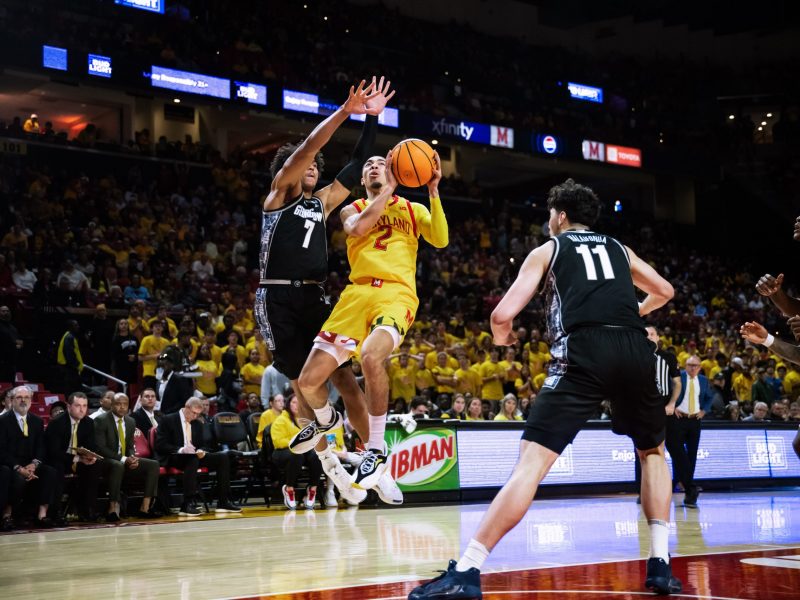As last season’s Maryland men’s basketball team made a run to the Sweet 16 for the first time since 2003, three of this year’s biggest contributors had yet to play a college game.
While guard Melo Trimble ran the Terps offense, Anthony Cowan did the same at St. John’s College High School, averaging 20.6 points per game and helping his squad end its 16-year WCAC title drought.
While forward Jake Layman stretched the floor for Mark Turgeon’s team, Justin Jackson provided Hill Academy in Ontario with an inside-out scorer.
And no player on Maryland’s roster quite resembled Kevin Huerter, a lanky 6-foot-7 sharpshooter and New York’s Gatorade Player of the Year as a senior.
Down four starters from last year’s group, Maryland has needed production from all three rookies 11 games into the 2016-17 campaign. Aside from Trimble, they’ve played the most minutes for the Terps (10-1), who have won six games by six or fewer points against a mediocre nonconference schedule. Turgeon affirmed these players could make an immediate impact this season, and each has delivered.
That success, according to their teammates and coaches, has come from the mindset of expecting the play right away. To them, the term “freshman” is just a label.
“The best compliment that I can give them is that they blended in,” assistant coach Dustin Clark said. “If you were sitting at practice, you wouldn’t be able to single them out and be like, ‘Oh, those are freshmen.’ It was more just about their approach.”
The trio, whom Turgeon just refers to as “the new guys,” has stood out for its play on the court. Cowan and Huerter outperformed last year’s backcourt reserves this preseason to earn starting spots since the season opener. After Jackson scored 17 points in the Terps’ 76-75 road win against Georgetown in their third game of the season, he joined the fellow freshmen in the starting lineup.
Jackson and Cowan are the team’s second-and third-leading scorers at 11.2 and 10 points per game, respectively, while Huerter averages 7.6. And against bigger and stronger competition, they’re some of the squad’s top rebounders. Cowan averages 4.7 boards per game, the fourth-highest mark of the team, despite being 6 feet tall.
“Just hunger always came from me,” Cowan said. “I don’t know what it was. Just being looked down upon sometimes or I don’t know. But that’s just always been in me, so I just always try to bring that to my game.”
***
Cowan and the rest of the freshmen, aside from Canary Islands native Joshua Tomaic, arrived in College Park during the summer, which Huerter said accelerated their adaption to the college game. The Terps staff had two hours a week to work with their players, focusing on individual and team workouts.
The younger players also competed in pickup games with veteran teammates during the summer, and Jackson immediately noticed the differences in physicality between high school and college. He remembers watching Trimble slash into the lane and forward Damonte Dodd swat away shots. In one of the first practices of the year, Jackson fell victim to Dodd’s rim-protecting prowess.
“I had like a drive, and I tried to dunk on [Dodd,] and he blocked me,” Jackson said. “I was like, ‘Oh man, I really got to step it up,’ because there’s guys just like him out there trying to do the same thing as he’s doing, so it’s going to be tough.”
All the while, the freshmen were training under director of basketball performance Kyle Tarp. The Terps didn’t only do traditional workouts such as squatting and benching. Huerter said other exercises were specific to basketball and were ones he hadn’t done before.
Add in the intensity and energy Tarp required from his players during the lifting sessions, and Huerter said these instances served as a “wake-up call” for the type of daily work ethic the Terps required. Cowan and Jackson agreed.
“Kyle Tarp, one of the best in the country,” Cowan said. “He definitely got my body ready for the type of bump I’m going to get in Big Ten play.”
***
The trio of first-year players spoke to how crucial it was to join the program before the team opened practice in October. When the 2016-17 campaign opened, they felt prepared.
Cowan’s ability to play point guard has allowed Trimble (17.2 points per game) to move off the ball, which he did in high school, after serving as the floor general in his first two seasons in College Park.
Cowan is also one of the team’s best defenders, Turgeon said, and he’s honed those skills guarding Trimble, a two-time All-Big Ten performer, in practice. Seeing the way Cowan defends him in practices gives Trimble reason to believe his freshman counterpart “can guard anybody.”
Up 71-70 against Oklahoma State on Dec. 3, Cowan guarded Jawun Evans, the nation’s sixth-leading scorer, as he dribbled down the court with about 10 seconds remaining. Evans forwent the ball screen and drove to his right, but Cowan kept him out of the lane and forced an acrobatic shot. The ball rolled off the rim, and Evans’ second attempt came after the final buzzer.
Huerter dealt with a similar situation against Georgetown on Nov. 15. Guard Jagan Mosely blew past Cowan and appeared to have an open lane for a layup to give the Hoyas a one-point lead with a few seconds to go. As he went up for the shot, however, Huerter pinned the ball against the backboard. Time expired moments later, and Huerter, whom Turgeon called one of the most consistent shooters he’s seen, sealed a 76-75 win with a defensive play.
Jackson kept the Terps in that game with his offense, scoring 17 points on 7-for-12 shooting, and said that performance was the moment he realized he could contribute at the college level. Two games later, the 6-foot-7 forward posted 21 points against Towson to help Maryland overcome a 13-point second-half deficit.
Those performances echoed what Jackson intended to accomplish in his first year with the program.
“I wanted to be an impact player, whether it’s coming off the bench, whether it’s starting. It doesn’t matter,” Jackson said. “I just wanted to come in here and make a difference.”
Perhaps the trio’s best combined was the 88-82 overtime win against Richmond on Nov. 25 in Brooklyn. Trimble poured in 31, but the freshmen combined to score 46 points, helping the Terps advance to the Barclays Center Classic final. The Terps beat Kansas State the next night, clinching their fourth straight holiday tournament title.
“They’ve handled everything,” Turgeon said before his team’s game with Pittsburgh on Nov. 29. “It’s funny. I was talking to [Kansas State coach] Bruce Weber after the game, and he said ‘Boy, your three young guys just played with great poise.’
“Anthony’s been that way his whole life, Kevin Huerter’s got great knowledge of the game, and Justin Jackson is just a baller.”
***
Despite their success, Turgeon maintains the freshmen have faced a learning curve. He wants to see Cowan do a better job running the offense and hopes Huerter can continue to improve defensively and start to score in a variety of ways.
Jackson is still getting used to Maryland’s offensive system, the sixth-year coach said, and added he’s a player the Terps are “still figuring out how to use.” In addition to Jackson getting to the rim and knocking down 3-pointers at a 47.2 percent clip, Turgeon envisions the Canadian developing a post-up game.
As each of the freshmen work to upgrade in these areas, they’ll have the luxury of learning from their veteran teammates.
Huerter forged a bond with junior Jared Nickens in the summer because of their similar body types. Both players are 6-foot-7 and weigh less than 210 pounds, so Nickens has told Huerter about the weight-gaining shakes he drinks and training regimens that have helped him bulk up.
Cowan, meanwhile, has taken on-court advice from Trimble and looked to junior Jaylen Brantley for leadership.
Jackson hasn’t been drawn to any specific player. He views the team as a family, something he noticed when he visited College Park before committing in May.
The upperclassmen, Jackson said, have welcomed all the new players into the Terps’ tight-knit group.
In response, Jackson, Huerter and Cowan have impressed their coaches and teammates about two months into their inaugural season.
“Winning is a culture, and something that we’ve been able to do is win close games,” Clark said. “Through practice and through just being in the locker room and talking, our veterans have given great leadership and taught these young guys our culture and the things that we do that allow us to be successful.”



